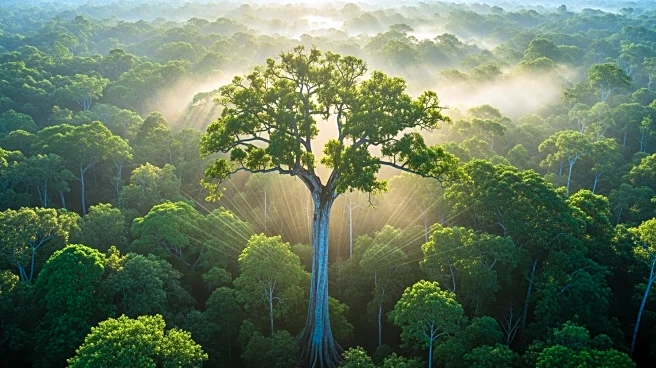What's Happening?
The COP30 climate summit, held in the Amazonian city of Belem, Brazil, focused on rainforest conservation and Indigenous participation in climate negotiations. The summit saw countries unlock billions
in new funds for forest conservation, with Germany pledging 1 billion euros to Brazil's Tropical Forests Forever Facility. Despite these financial commitments, the summit concluded without a concrete plan to halt deforestation, relying instead on a voluntary roadmap. The event marked a record presence of Indigenous delegates, with 3,000 leaders participating, highlighting their crucial role in protecting ecosystems like the Amazon. Brazil announced the demarcation of 10 new Indigenous lands, covering nearly 1,000 square miles, and allocated a portion of the forest fund to Indigenous peoples.
Why It's Important?
The COP30 summit underscores the critical role of tropical forests in combating climate change, as they store significant amounts of carbon. The financial commitments made at the summit aim to support global conservation efforts, which are vital for maintaining biodiversity and preventing further deforestation. The involvement of Indigenous peoples is particularly significant, as they are key stewards of these ecosystems. However, the lack of a binding agreement to end deforestation raises concerns about the effectiveness of voluntary measures. The summit's outcomes could influence future climate policies and international cooperation on environmental issues.
What's Next?
Brazil's government anticipates further contributions to the Tropical Forests Forever Facility from countries like China and the United Arab Emirates, aiming to reach $10 billion by year-end. The voluntary roadmap proposed at COP30 may guide future efforts to transition away from fossil fuels and promote forest-friendly practices. The demarcation of new Indigenous lands could strengthen their role in forest conservation. Continued international collaboration and funding are essential to achieving the 2030 zero-deforestation pledge and supporting Indigenous communities in their conservation efforts.
Beyond the Headlines
The summit highlighted the interconnectedness of climate change and biodiversity loss, emphasizing the need for integrated approaches to address these challenges. The increased presence of Indigenous delegates reflects a growing recognition of their rights and contributions to environmental stewardship. The demarcation of Indigenous lands as a climate policy could set a precedent for future negotiations, potentially leading to more formal recognition of Indigenous rights in climate agreements. The summit's focus on voluntary measures raises questions about accountability and enforcement in global climate commitments.









